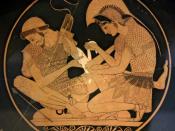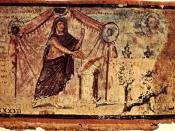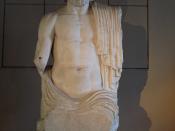Joshua N. D'Aluisio-Guerrieri [Im]mortal Relationships in the Iliad Within any single religion, even today, it is often difficult to clarify the ever-evolving relationship between the god(s) and their worshippers. The situation is even more complex when faced with Greek super-polytheism that existed three millennia ago. Combine an oral tradition with countless gods and mortal heroes fighting over a besieged city, and one has the Iliad, a lengthy poem rife with controversial themes. Arguably the most contentious of its themes centers on its divine characters and their relationships with mortal beings. Though scholars point out that completely removing the gods from the Iliad's world would not affect the likeliness of its course of events, their presence is nonetheless pervasive, and, contrary to what these scholars' observations would suggest, Homer presents the gods in a manner seemingly essential to the plot. Thus, it is important to examine their function in the poem, especially with regard to their primary role: to oversee mankind.
But it is difficult to define the meaning of that role, as evidence supports multiple kinds of relationships between immortals and mortals. In these relationships, the most significant variable is the degree to which gods determine fate. The spectrum ranges from a completely deterministic view, where the gods enforce fate and render humans choiceless, to an "ineffectual" view, where immortal beings are nothing more than the personification of human feelings. With evidence supporting both views, it is most plausible to place the god-human relationship somewhere between the two.
First of all, fundamental to a discussion of relationship is a comparison between the characteristics of the subjects involved. Gods and humans share a number of attributes; society on Mount Olympus is parallel to human society in almost every way. Most important in terms of cultural structure, patrilineal organization defines...


